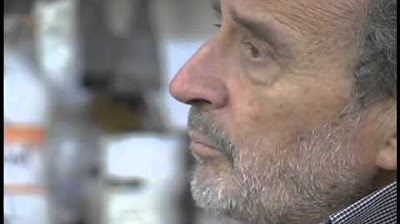Ser distinto: Manu Ginóbili at TEDxBuenosAires
Summary
TLDREn este inspirador discurso, Manu Ginóbili reflexiona sobre su trayectoria en el baloncesto, desde sus inicios humildes hasta convertirse en un campeón olímpico y jugador de la NBA. A través de su historia, destaca el valor del esfuerzo, la autoconfianza y la capacidad de adaptarse y aprender continuamente. Ginóbili también explora los diferentes talentos necesarios para tener éxito en el deporte y la importancia de trabajar en equipo. Finalmente, comparte su incertidumbre sobre la vida después del baloncesto, consciente de que las emociones vividas en el deporte son irrepetibles.
Takeaways
- 🏀 Manu Ginóbili es un apasionado seguidor de las charlas TED y le entusiasmó la idea de dar una charla sobre 'ser diferente', aunque al principio tuvo dudas y miedo.
- 🎯 A los 15 años, Manu no era considerado un prodigio del baloncesto, pero su pasión por el deporte lo llevó a entrenar más duro y a seguir los pasos de sus hermanos mayores.
- 💪 A pesar de no destacar inicialmente, Manu trabajó incansablemente en su desarrollo físico y mental, dedicándose a mejorar su juego y a convertirse en profesional.
- 🌍 Un momento crucial en su carrera fue su participación en el Campeonato Mundial de 1997, lo que incrementó su confianza y lo impulsó a seguir desafiándose.
- 🇮🇹 Tras su paso por Argentina, Manu emigró a Italia, donde su carrera dio un salto significativo al jugar en un equipo de segunda división y luego ser fichado por uno de los mejores equipos de Europa.
- 🏆 Con el tiempo, Manu ganó campeonatos en la liga italiana y europea, consolidando su lugar entre la élite del baloncesto europeo antes de dar el salto a la NBA.
- 🇺🇸 En la NBA, Manu enfrentó dificultades iniciales debido a lesiones y un rol limitado, pero perseveró y eventualmente se ganó la confianza de su equipo, los San Antonio Spurs.
- 🥇 Su victoria en los Juegos Olímpicos de 2004 con Argentina le dio una confianza incomparable, y regresó a la NBA con una mentalidad renovada y sin nada que demostrar.
- ✨ Manu reflexiona sobre lo que realmente significa el 'talento', concluyendo que es una combinación de habilidades, trabajo en equipo, altruismo y autoconocimiento de las propias limitaciones.
- ⏳ Manu se pregunta cómo será su vida después del baloncesto, consciente de que nada podrá igualar las emociones vividas en su carrera, pero abierto a enfrentar nuevos desafíos en la segunda mitad de su vida.
Q & A
¿Qué sensación tuvo el orador cuando le ofrecieron hablar sobre 'ser diferente'?
-El orador sintió miedo e incertidumbre porque nunca había reflexionado o analizado profundamente lo que significaba ser diferente. Le preocupaba sonar arrogante o presumido al hablar del tema.
¿Qué lo motivó a mejorar en el baloncesto cuando era adolescente?
-El orador tenía una gran pasión por el baloncesto y quería seguir los pasos de sus hermanos, quienes ya eran profesionales. Esto lo motivó a entrenar más, ir al gimnasio, ver videos y mejorar su juego.
¿Qué cambio mental experimentó después de participar en el Campeonato Mundial Juvenil?
-Después de formar parte del equipo nacional en el Campeonato Mundial Juvenil, el orador experimentó un aumento en su confianza y autoestima, lo que le permitió jugar con más seguridad y fijarse metas más ambiciosas.
¿Cómo describió el orador su llegada a la NBA?
-El orador describió su llegada a la NBA como un cambio radical, pasando de verlo por televisión a formar parte de ese mundo. Sin embargo, los primeros meses fueron difíciles debido a lesiones y un rol limitado en el equipo.
¿Cuál fue el punto clave en su carrera que le dio más confianza?
-El orador considera que los Juegos Olímpicos de 2004 fueron un punto clave en su carrera. Ganar la medalla de oro con el equipo argentino, eliminando a Estados Unidos, le dio una confianza superlativa que cambió su mentalidad en la NBA.
¿Qué talento considera el orador más importante para el éxito en el deporte?
-El orador considera que establecer objetivos claros y no desviarse de ellos es uno de los talentos más importantes para el éxito. La capacidad de enfocarse en una meta y hacer todo lo posible para alcanzarla fue crucial en su carrera.
¿Cómo define el orador el verdadero significado del talento?
-El orador cree que el talento no es solo hacer jugadas bonitas. Para él, el talento incluye muchas habilidades como entender lo que el equipo necesita, saber ceder el protagonismo cuando es necesario y disfrutar del éxito de los compañeros.
¿Qué desafío enfrenta el orador al retirarse del baloncesto?
-El desafío que enfrenta es cómo lidiar con la falta de las emociones intensas que vivió en el deporte, como la adrenalina de los grandes partidos. Se pregunta cómo podrá encontrar satisfacción en una nueva vida fuera del deporte.
¿Cómo describe el orador la sensación de ganar una medalla de oro en los Juegos Olímpicos?
-El orador describe la sensación de ganar la medalla de oro como algo único y emotivo. Recuerda con nostalgia cómo abrazó a sus compañeros al final del partido, disfrutando de un momento irrepetible en su vida.
¿Qué lección importante aprendió el orador sobre las limitaciones personales en el deporte?
-El orador aprendió que es importante reconocer las propias limitaciones. A veces, aunque uno quiera sobresalir, hay equipos o estrategias que son mejores, y es crucial saber cuándo ceder por el bien del equipo.
Outlines

此内容仅限付费用户访问。 请升级后访问。
立即升级Mindmap

此内容仅限付费用户访问。 请升级后访问。
立即升级Keywords

此内容仅限付费用户访问。 请升级后访问。
立即升级Highlights

此内容仅限付费用户访问。 请升级后访问。
立即升级Transcripts

此内容仅限付费用户访问。 请升级后访问。
立即升级浏览更多相关视频

🏀HISTORIA DEL BASQUETBOL | Baloncesto | La Magia del Basquet 🏀

ARNOLD SCHWARZENEGGER deja a la audiencia SIN PALABRAS | Uno de los mejores discursos de motivación

IMPRENTA MADERO. OBJETOS. Fábrica de objetos para leer

Dr. Eric Cole's journey to becoming a CISO. (Part 1)

LA HISTORIA DE MOMO | Documental

20 aniversario de Gioseppo
5.0 / 5 (0 votes)
